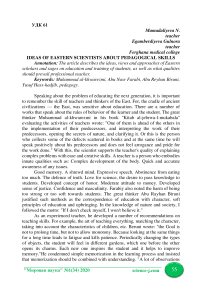Ideas of eastern scientists about pedagogical skills
Автор: Mamadaliyeva N., Egamberdiyeva Gulnora
Журнал: Мировая наука @science-j
Рубрика: Основной раздел
Статья в выпуске: 1 (34), 2020 года.
Бесплатный доступ
The article describes the ideas, views and approaches of Eastern scholars and sages on education and training of students, as well as what qualities should prevail professional teacher.
Muhammad al-khwarezmi, abu nasr farabi, abu reyhan biruni, yusuf hass-hadjib, pedagogy
Короткий адрес: https://sciup.org/140265039
IDR: 140265039 | УДК: 61
Текст научной статьи Ideas of eastern scientists about pedagogical skills
Speaking about the problem of educating the next generation, it is important to remember the skill of teachers and thinkers of the East. For, the cradle of ancient civilizations — the East, was sensitive about education. There are a number of works that speak about the rules of behavior of the learner and the student. The great thinker Muhammad al-khwarezmi in his book "Kitab al-jebrwa-l-mukabala" evaluating the activities of teachers wrote: "One of them is ahead of the others in the implementation of their predecessors, and interpreting the work of their predecessors, opening the secrets of nature, and clarifying it. Or this is the person who collects some of the defects scattered in books and at the same time he will speak positively about his predecessors and does not feel arrogance and pride for the work done. " With this, the scientist supports the teacher's quality of explaining complex problems with ease and creative skills. A teacher is a person who embodies innate qualities such as: Complex development of the body. Quick and accurate awareness of any issues.
Good memory. A shrewd mind. Expressive speech. Abstinence from eating too much. The defence of truth. Love for science, the desire to pass knowledge to students. Developed concept of honor. Moderate attitude to money. Developed sense of justice. Confidence and masculinity. Farabiy also noted the harm of being too strong or too soft towards students. The great thinker Abu Rayhan Biruni justified such methods as the correspondence of education with character, soft principles of education and upbringing. In the knowledge of nature and society, I followed the motto: "If I don't check myself, I won't believe it."
In the "Canon of medical science" gave advice on the work of speech hygiene teacher. He said that talking for a long time with a loud sound is very dangerous, harming the health of both the teacher and the student. Because screaming requires a large amount of outdoor air, which is doubly dangerous. In order not to lose your voice and not give up breathing, you should start reading in a half-voice, and then gradually increase, but with a strong voice, reading should not last too long. The constant loud voice of the teacher not only negatively affects the hearing, but also depresses the mental state of the student.
Similarly, the scholar Abu Ali Ibn Sina confirms: "the Human character can be brought up by the melodies of Makoms." That is, each part of the Macome serves as an educational and therapeutic value. Yusuf has hadjib in the work "Kutadgu Bilig" ("blessed knowledge") writes about the personality of the teacher: "Choose the best teachers. Children will grow up clean in body and spirit. Teach boys and girls ethics. Two worlds will belong to them, will benefit. Teach your son all kinds of arts and crafts to perfection. With this, he will collect wealth. The Talib should choose the best of all Sciences - the one that he needs now for the profession of his religion, and then the science that he needs in the future. " Burkhoniddin Zarnudzhiy (1150) in the book "Method of acquiring knowledge" developed methods for developing rapid and thorough knowledge.
He says: "the Student should choose from all kinds of Sciences the most necessary-the one that he needs. Interest in knowledge requires that the student be patient with the teacher and the subject, this will help avoid disasters. There are 6 conditions for learning: intellectual abilities, strong motivation, endurance, good nutrition, and enough time for education. It is not necessary for a student to sit too close to the teacher in class. The distance between the teacher and the Talib should be about the size of a bow (approximately 1 meter). Keeping this distance is a sign of respect for the teacher. The student should try to study and learn their lessons early in the morning and at the end of the day. And he must use his youth to gain knowledge. It is not appropriate for a student to overextend himself with the study of science, i.e. he should not overwork himself so that there is no need to drop out of school. And, on the contrary, there should be moderation in loads. Since moderation is an important Foundation of all Affairs.
Studying the views and approaches of Eastern scholars and sages on education and training, we see that they have not lost their relevance in the present. Today, one of the most important issues facing the world is the education of both spiritually and physically talented, intelligent young people with modern and healthy thinking. Thus, the works of Eastern philosophers do not reasonably follow the recommendations of research and practice.
Список литературы Ideas of eastern scientists about pedagogical skills
- Mirzo Muhammad. Tarihi Rashidi. - T.: O'zbekiston, 2011.
- Daukeeva S. Philosophy of music of Abu Nasr Muhammad al-Farabi. - Alma-ATA. 2002.


